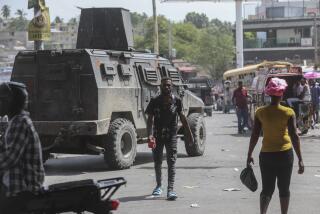Sudan OKs peacekeepers for Darfur
- Share via
UNITED NATIONS — Sudan on Tuesday accepted a combined United Nations and African Union peacekeeping force of up to 23,000 troops and police to stabilize to the war-torn Darfur region.
But U.N. diplomats, cautious after months of waffling by the regime, were not ready to celebrate a breakthrough.
The agreement came before a Security Council mission to Khartoum on Saturday to press for an end to the government-stoked conflict in Darfur. At the end of a two-day summit of Sudanese, U.N. and African Union officials in Ethiopia, Sudan also agreed Tuesday on the need for an immediate cease-fire and peace talks with rebel groups to end four years of fighting.
Sudan had initially agreed to the joint force in November, but it has backtracked and added conditions in the months since.
On Tuesday, Sudanese officials were still demanding that the force be made up of African troops with an African Union commander, preferences that U.N. peacekeeping officials say they will bear in mind, but not be bound by.
Zalmay Khalilzad, U.S. ambassador to the world body, said any conditions on the force were “unacceptable.”
“We have said that if we don’t get an unconditional acceptance of the AU-U.N. concept on the hybrid force, then several of us are of the view that we have to go with additional sanctions, tightening sanctions to incentivize the government to cooperate,” he said.
The United States strengthened its unilateral economic sanctions against Sudan last month.
Officials from the U.N., AU and Sudan met in Addis Ababa, the Ethiopian capital, to jump-start a three-stage plan for a joint force to back up 7,000 overwhelmed and underpaid African Union troops already in Darfur.
Sudan has agreed to the first two phases of the plan, accepting up to 3,000 police and troops by the end of the year to prepare for the new 23,000-strong force.
“We are fulfilling our commitments to the international community,” said Sudan’s ambassador to the U.N., Abdalmahmood Abdalhaleem. “It is the turn of others to fulfill theirs, and stop talking about threats and sanctions.”
The government in Khartoum has depicted the peacekeeping force as a “foreign occupation” and has insisted that the soldiers be African and be commanded by the AU, not the world body.
The force will be led by Martin Agwai, a Nigerian general who also has served as a U.N. peacekeeping official. But the United Nations will not pay for a force it does not control, and insists on overall command.
Peacekeeping officials say they will recruit soldiers first from African countries, but if there are not enough, they will look elsewhere.
The full force will take about a year to deploy, said a senior peacekeeping official.
“Our top priority is to get capable troops on the ground in Darfur,” said Nick Birnback, a spokesman for the U.N.’s peacekeeping department.
The push for soldiers to stabilize the region comes amid renewed diplomatic efforts.
International experts estimate that at least 200,000 people have been killed and more than 2 million displaced in the fighting between rebels and the Sudanese government over Darfur’s resources and autonomy.
The government says only 9,000 have died and denies any ties to militias accused of carrying out systematic attacks on civilians in the rebel zones.
U.N. envoys are going to Sudan at the end of the month to press for a cease-fire, the disarmament of militias, humanitarian access and the full deployment of peacekeepers.
The rebel movement has splintered into more than a dozen groups, making negotiations between the government and its opposition more difficult, said envoy Jan Eliasson, a former Swedish foreign minister. The government reportedly also has lost control of some militia groups, making it hard to rein them in.
Abdalhaleem, the Sudanese ambassador, said that Khartoum rejected a French proposal to have a summit on Darfur on June 25, because there were too many competing initiatives.
“It is ill-timed,” he said. “We must first give the U.N. peace plan time to mature.”
--
More to Read
Sign up for Essential California
The most important California stories and recommendations in your inbox every morning.
You may occasionally receive promotional content from the Los Angeles Times.













